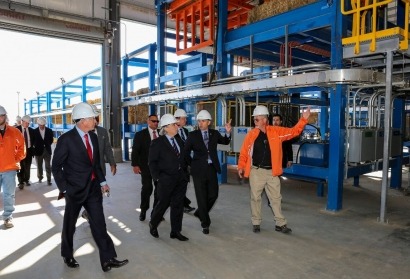
The grand opening of the facility was attended by US Energy Secretary Dr. Ernest Moniz, Kansas Gov. Sam Brownback, Former US Interior Secretary Ken Salazar, Kansas Sen. Pat Roberts, Hugoton Mayor Jack Rowden, Abengoa CEO Manuel Sánchez Ortega.
Construction on the biorefinery was completed in August, and it began producing cellulosic ethanol at a month later. The new plant has a capacity to produce up to 25 million gallons per year, Abengoa said.
“The Hugoton plant opening is the result of 10 years of technical development, roughly 40,000 hours of pilot and demonstration plant operation, and the support of the DOE,” said Manuel Sánchez Ortega. “This is a proud and pivotal moment for Abengoa and for the larger advanced bioenergy industry – and further demonstrates our longstanding commitment to providing sustainable energy alternatives in the United States. This would have been simply impossible without the establishment of the Renewable Fuel Standard.”
The plant utilizes only “second generation” (2G) biomass feedstocks for ethanol production, meaning non-edible agricultural crop residues (such as stalks and leaves) that do not compete with food or feed grain.
The state-of-the-art facility also features an electricity cogeneration component allowing it to operate as a self-sufficient renewable energy producer. By utilizing residual biomass solids from the ethanol conversion process, the plant generates 21 megawatts (MW) of electricity – enough to power itself and provide excess clean renewable power to the local Stevens County community.
The Hugoton plant opening also marks the first-ever commercial deployment of Abengoa’s proprietary enzymatic hydrolysis technology, which turns biomass into fermentable sugars that are then converted to ethanol. Among the first wave of commercial-scale ethanol plants in the country, Hugoton builds on recent industry momentum showcasing cellulosic ethanol as a sustainable alternative fuel source that significantly reduces greenhouse gas emissions and increases energy independence.
In addition to the plant’s crucial role in proving the commercial viability of cellulosic ethanol, its success provides a platform for the company’s future development of other bioproducts that reduce petroleum use, such as bioplastics, biochemicals and drop-in jet fuel.
At full capacity, the Hugoton facility will process 1,000 tons per day of biomass, most of which is harvested within a 50-mile radius each year – providing $17 million per year of extra income for local farmers whose agricultural waste would otherwise have little or no value. Of that biomass, more than 80 percent is expected to consist of irrigated corn stover, with the remainder comprised of wheat straw, milo stubble and switchgrass.
Abengoa plans to offer licenses and contracts to interested parties covering every aspect of this new industry – from process design, to engineering, procurement and construction (EPC), supply of exclusive enzymes, as well as operations and marketing of the completed products from the facility.
The proprietary enzymatic hydrolysis technology utilized commercially at Hugoton is also a focal point in Abengoa’s efforts to diversify the range of raw material feedstocks from which biofuels and bioproducts can be produced. For example, for more than a year the company has been operating a demonstration-scale facility that is capitalizing on the same technology and enzyme cocktail used at Hugoton to extract cellulosic sugars from municipal solid waste (trash), thereby allowing expansion of the renewable fuels industry from rural to urban areas.
For additional information:

